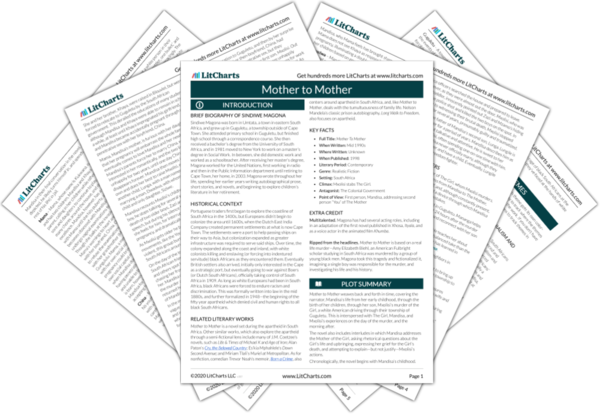“AmaBhulu, azizinja!” Quotes in Mother to Mother
AmaBhulu, azizinja! Today’s youth have been singing a different song. Whites are dogs! Not a new thought, by any means. We had said that all along. As far back as I can remember. Someone would come back from work fuming: amaBhulu azizinja, because of some unfairness they believed had been meted out to them that day. A slap. A kick. Deduction from wages. A deduction, neither discussed nor explained. Unless, a gruff – YOU ALWAYS LATE! or YOU BROKE MY PLATE! or YOU NOT VERY NICE TO MY MOTHER! qualifies as explanation. So yes, our children grew up in our homes, where we called white people dogs as a matter of idiom ... heart-felt idiom, I can tell you. Based on bitter experience.
AmaBhulu, azizinja! they sang. And went and burnt down their schools. That’s uncalled for, a few of us mumbled beneath our breath. Well beneath. Even so, we were quickly reprimanded. There was a war on. Besides, those ramshackle, barren things were no schools. No learning took place there.
But swiftly, our children graduated from stoning cars, white people’s cars. They graduated from that and from burning buildings. Unoccupied buildings. Public buildings. Now, they started stoning black people’s cars. And burning black people’s houses.
We reasoned that those black people to whom such a thing happened deserved what they got. The children were punishing them for one or another misdeed. Or, indeed, some misdeeds. They had collaborated with the repressive apartheid government. Iimpimpi, informers, we labeled the whole miserable lot. People on whom the students’ righteous and wrathful acts fell.

Unlock explanations and citation info for this and every other Mother to Mother quote.
Plus so much more...
Get LitCharts A+There is knowledge with which I was born — or which I acquired at such an early age it is as though it was there the moment I came to know myself ... to know that I was. We sucked it from our mothers’ breasts, at the very least; inhaled it from the very air, for most.
Long before I went to school I knew when Tata had had a hard day at work. He would grumble, “Those dogs I work for!” and fuss about, and take long swigs from the bottle.
Mama’s own quarrel with bosses often came on the day when Tata got paid. For some reason, her dissatisfaction with Tata’s conditions of employment seemed to deepen on Fridays.
I remember when, one Friday, she exploded:
“Sesilamba nje, beb’ umhlaba wethu abelungu! We have come thus to hunger, for white people stole our land.” […] Later, I was to hear those words with growing frequency. “White people stole our land. They stole our herds. We have no cattle today, and the people who came here without any have worlds of farms, overflowing with fattest cattle”
That unforgiving moment. My son. Blood pounding in his ears. King! If for a day. If for a paltry five minutes ... a miserable but searing second.
AMANDLA! NGAWETHU! POWER! IT 1S OURS!
AMANDLA! NGAWETHU! POWER! IT IS OURS!
[…] Transported, the crowd responded; not dwelling on the significance of the word, deaf and blind to the seeds from which it sprang, the pitiful powerlessness that had brewed this very moment
And the song in my son’s ears. A song he had heard since he could walk. Even before he could walk. Song of hate, of despair, of rage. Song of impotent loathing.
AMABHULU, AZIZINJA!
AMABHULU, AZIZINJA!
BOERS, THEY ARE DOGS!
BOERS, THEY ARE DOGS!
[…] The crowd cheers my son on. One settler! One bullet! We had been cheering him on since the day he was born. Before he was born. Long before.












